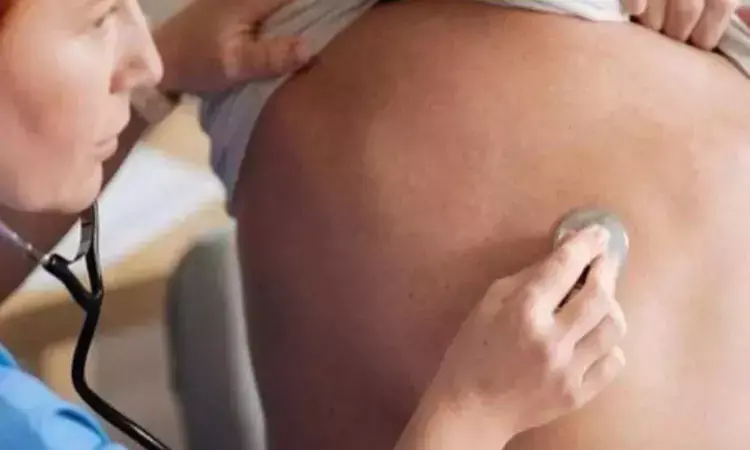- Home
- Medical news & Guidelines
- Anesthesiology
- Cardiology and CTVS
- Critical Care
- Dentistry
- Dermatology
- Diabetes and Endocrinology
- ENT
- Gastroenterology
- Medicine
- Nephrology
- Neurology
- Obstretics-Gynaecology
- Oncology
- Ophthalmology
- Orthopaedics
- Pediatrics-Neonatology
- Psychiatry
- Pulmonology
- Radiology
- Surgery
- Urology
- Laboratory Medicine
- Diet
- Nursing
- Paramedical
- Physiotherapy
- Health news
- Fact Check
- Bone Health Fact Check
- Brain Health Fact Check
- Cancer Related Fact Check
- Child Care Fact Check
- Dental and oral health fact check
- Diabetes and metabolic health fact check
- Diet and Nutrition Fact Check
- Eye and ENT Care Fact Check
- Fitness fact check
- Gut health fact check
- Heart health fact check
- Kidney health fact check
- Medical education fact check
- Men's health fact check
- Respiratory fact check
- Skin and hair care fact check
- Vaccine and Immunization fact check
- Women's health fact check
- AYUSH
- State News
- Andaman and Nicobar Islands
- Andhra Pradesh
- Arunachal Pradesh
- Assam
- Bihar
- Chandigarh
- Chattisgarh
- Dadra and Nagar Haveli
- Daman and Diu
- Delhi
- Goa
- Gujarat
- Haryana
- Himachal Pradesh
- Jammu & Kashmir
- Jharkhand
- Karnataka
- Kerala
- Ladakh
- Lakshadweep
- Madhya Pradesh
- Maharashtra
- Manipur
- Meghalaya
- Mizoram
- Nagaland
- Odisha
- Puducherry
- Punjab
- Rajasthan
- Sikkim
- Tamil Nadu
- Telangana
- Tripura
- Uttar Pradesh
- Uttrakhand
- West Bengal
- Medical Education
- Industry
GERD increases risk of Idiopathic Pulmonary Fibrosis

Gastro-esophageal reflux disease (GERD) increases risk of Idiopathic Pulmonary Fibrosis suggests a new study published in the journal of European Respiratory Society.
Gastro-esophageal reflux disease (GERD) is associated with idiopathic pulmonary fibrosis (IPF) in observational studies. It is not known if this association arises because GERD causes IPF, or IPF causes GERD, or because of confounding by factors, such as smoking, associated with both GERD and IPF. We used bidirectional Mendelian randomisation (MR), where genetic variants are used as instrumental variables to address issues of confounding and reverse causation, to examine how, if at all, GERD and IPF are causally related.
Results
A bidirectional two-sample MR was performed to estimate the causal effect of GERD on IPF risk, and of IPF on GERD risk, using genetic data from the largest GERD (78 707 cases and 288 734 controls) and IPF (4125 cases and 20 464 controls) genome-wide association meta-analyses currently available. GERD increased the risk of IPF, with an odds ratio (OR) of 1.6 (95% Confidence Interval, CI: 1.04–2.49; p=0.032). There was no evidence of a causal effect of IPF on the risk of GERD, with an OR of 0.999 (95%CI: 0.997–1.000; p=0.245).
Researchers found that GERD increases the risk of IPF, but found no evidence that IPF increases the risk of GERD. GERD should be considered in future studies of IPF risk, and interest in it as a potential therapeutic target should be renewed. The mechanisms underlying the effect of GERD on IPF should also be investigated.
Reference:
Carl J Reynolds, Fabiola Del Greco M, Richard J Allen, Carlos Flores, R Gisli Jenkins, Toby M Maher, Philip L Molyneaux, Imre Noth, Justin M Oldham, Louise V Wain, Jiyuan An, Jue-Sheng Ong, Stuart MacGregor, Tom A. Yates, Paul Cullinan, Cosetta Minelli.The causal relationship between gastro-esophageal reflux disease and idiopathic pulmonary fibrosis: A bidirectional two-sample Mendelian randomization study. European Respiratory Journal 2023; DOI: 10.1183/13993003.01585-2022
Dr. Shravani Dali has completed her BDS from Pravara institute of medical sciences, loni. Following which she extensively worked in the healthcare sector for 2+ years. She has been actively involved in writing blogs in field of health and wellness. Currently she is pursuing her Masters of public health-health administration from Tata institute of social sciences. She can be contacted at editorial@medicaldialogues.in.
Dr Kamal Kant Kohli-MBBS, DTCD- a chest specialist with more than 30 years of practice and a flair for writing clinical articles, Dr Kamal Kant Kohli joined Medical Dialogues as a Chief Editor of Medical News. Besides writing articles, as an editor, he proofreads and verifies all the medical content published on Medical Dialogues including those coming from journals, studies,medical conferences,guidelines etc. Email: drkohli@medicaldialogues.in. Contact no. 011-43720751


